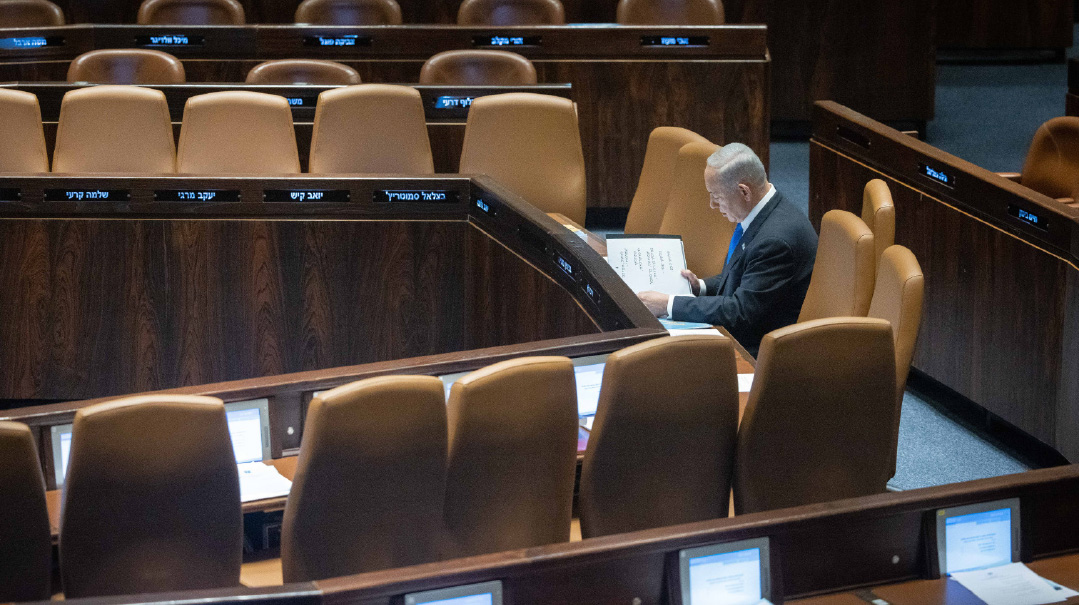Israel’s Brand of Chaos

American presidents choose an attorney general with whom they share a political affinity. Not so in Israel

Imagine if, when Donald Trump took office in 2017, the law had required him to retain Obama’s attorney general (AG), Loretta Lynch, or if President Biden had gotten saddled with Trump’s AG, William Barr.
American presidents choose an attorney general with whom they share a political affinity. Not so in Israel, where the AG is appointed for a six-year term and remains glued to their chair no matter how many elections occur during their tenure.
Binyamin Netanyahu, who returned to the prime minister’s office two months ago, is stuck with AG Gali Maharav-Biara, appointed ten months earlier by his political nemesis, Gideon Saar. Maharav-Biara vaulted to the top of a short list of candidates, without any public hearings, and the cabinet approved her appointment after less than 15 minutes of debate.
While the AG is supposed to be a “civil service” appointment whose role is to serve as legal counsel to the government, sometimes it appears as if she’s working against them.
The unelected Maharav-Biara has more power than Binyamin Netanyahu, whose Likud party received 1.1 million votes in the last election. Maharav-Biara forbade Netanyahu both from speaking out publicly about Israel’s proposed judicial reforms and from even discussing them in private with members of his government. She contends that Netanyahu has a personal interest in judicial reform, considering he is on trial for breach of trust and bribery charges. After President Herzog addressed the nation offering a five-point compromise plan, Maharav-Biara rejected Netanyahu’s request to comment on the plan.
It has also been reported that the AG considered asking that Netanyahu be declared “incapacitated” to serve in office because of his ongoing trial on charges of breach of trust and bribery, even though the case against him is falling apart in a Jerusalem district court. Her office denied that report, but the matter is yet to be adjudicated.
Responding to a petition filed by a group called the Movement for Quality Government, the High Court of Justice ordered the government to present arguments to the court on March 12 as to why Netanyahu shouldn’t be suspended.
You get one guess as to who gets to “defend” Bibi in court. If you guessed the AG, you would be correct.
Never mind the fact that under Israeli law, a prime minister under indictment, or on trial, may continue serving — even if convicted — until all appeals are exhausted. The law authorizing a prime minister or president to be declared incapacitated was intended for application in cases where a high public official is physically debilitated or mentally incapable of fulfilling his duties — for example, when Prime Minister Ariel Sharon suffered a stroke.
And when Prime Minister Ehud Olmert ran afoul of the law, the High Court ruled that any such declaration of incapacitation in the context of a criminal investigation of a prime minister is “an extreme step that may be taken only in rare and exceptional cases.”
Now, guess again: If the High Court indicates that Netanyahu’s case is indeed “rare and exceptional,” who by law is authorized to make the final declaration of incapacitation? If you once again guessed the AG, you’re two-for-two. If that isn’t a conflict of interest, what is?
If you think the street demonstrations against judicial reform are creating chaos, which they are, can you imagine the bedlam if Netanyahu were suspended by what would be tantamount to a judicial coup? While it wouldn’t render the last election null and void, because the law allows the Knesset to choose a new prime minister and government before going to new elections, unseating an incumbent prime minister without a legal precedent would present a greater threat to democracy than any of the proposed judicial reforms that are riling everybody up.
While a Netanyahu suspension is an unlikely scenario, now that the current elite who runs Israel’s judiciary feel their backs are up against the wall, I wouldn’t put anything past anyone holding the power in their hands. If anything points to the need for judicial reforms, that’s it.
(Originally featured in Mishpacha, Issue 950)
Oops! We could not locate your form.







